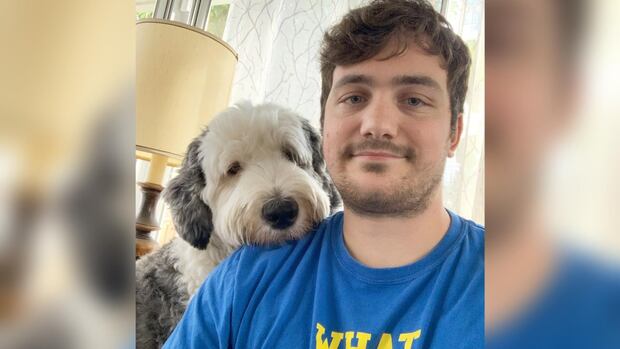
He wants the bylaw changed so dog owners have to exchange info after a biting
CBC
A London dog owner is pushing for a bylaw change after his dog was bitten, and the owner of the other dog refused to share their contact information.
Stephen Karchut's dog Sampson was attacked while the pair were out for a walk in the area of Clarke Road and Hamilton Road in late October. He was walking along the sidewalk with Sampson on a leash when someone alerted him to another dog coming up behind him quickly.
"This dog was racing toward Sampson," said Karchut. "The owner didn't have control of their dog. It had slipped off its leash."
Sampson is an old English sheepdog and weighs more than 100 pounds. Within moments, Sampson was bitten by the other dog, which Karchut guesses was a pug or bulldog cross.
"Sampson was bit in his jowls and hindquarters," said Karchut. "He started to freak out."
Karchut tried to protect his dog, but the attacker kept circling behind him. With no collar or leash on the other dog, Karchut said he was powerless to restrain the other dog. At first the other dog's owner was not there to help, but Karchut said she showed up a few minutes after the attack began, leashed her dog and left without responding to Karchut's requests to exchange information.
Karchut said he wanted the other's dog information to confirm it had been vaccinated. He also wanted to be compensated for any vet bills. Karchut said there was no licence or vaccine tags on the other dog's collar. London's dog bylaw requires all dogs older than six months of age to be licensed and for a valid dog tag to be fixed to the dog at all times.
As it turned out, Sampson wasn't badly hurt in the attack, but Karchut feels the bylaw should require dog owners to exchange information after a biting incident.
Karchut raised the issue with staff at London Animal Care Centre, which is operated by Urban Animal Management Inc. under contract with the city. The organization's contract includes providing adoption services, licensing, registration and bylaw enforcement.
Karchut said the manager he spoke to was sympathetic, but said there are limits to what they can do while investigating a dog bite. He was told they can locate a dog's owner through vehicle licence plate information or though an address if it's known. However, there's nothing to compel a person to provide their contact information upon request.
Karchut would like to see that change.
"When my dog is attacked in my neighbourhood, why am I now required to go door-to-door or follow the attacking dog to find out where they live?" he said. "That could lead to a confrontation. We don't know how the other dog owner is going to react."
CBC News reached out to management at the London Animal Care Centre for comment. A representative said they would work to provide a response, which will be added to this story when it's received.
Karchut has now decided to raise the issue at City Hall. His ward councillor Hadleigh McAllister has written a letter — now on the agenda for the Jan. 6 community and protective services committee meeting — asking staff to review the bylaw with a "particular focus on examining the enforcement of licensing and sharing of information following a dog attack."





















 Run 3 Space | Play Space Running Game
Run 3 Space | Play Space Running Game Traffic Jam 3D | Online Racing Game
Traffic Jam 3D | Online Racing Game Duck Hunt | Play Old Classic Game
Duck Hunt | Play Old Classic Game











